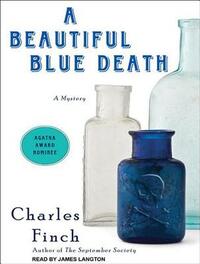Take a photo of a barcode or cover

This will be short cause I really loathed this book. It took me two days to get through. If not for the fact that a DNF does not count towards bingo, I would have done so at the 10 percent point. This book is tedious, boring, and overwrought somehow all at the same time. The main character is opposite day Sherlock Holmes. I really wanted him to reach a terrible end, but since this is the first book in a 11 book series, there was not much hope of that. I heard through reliable readers that the series gets better. I hope so.
I read this for the "Darkest London" square since this is a mystery taking place in London during the Victorian age.
The lead character is Charles Lenox. He is self proclaimed amateur sleuth who helps out the Yard from time to time. He has a Yard inspector that doesn't like him, a close friendship with a childhood friend, another friend who is a doctor with a drinking problem, and his butler is used as his runner for certain jobs he needs him to do. When his childhood friend and London neighbor, Lady Jane asks him to look into whether a former maid of hers was murdered, he does. Frankly, I never got a good reason why Lady Jane cared, but that is neither here or there. So off Lenox goes to stick his nose in and quickly deduces that the former maid (Prudence Smith) was poisoned. Hence the name "A Beautiful Blue Death."
Lenox really is just a boring type of Sherlock Holmes. He fusses about being cold, his feet being cold, being wet, taking naps, how much toast to eat, his freaking tea, wine, scotch and soda, everything. I have never read so many boring descriptions about what a character was doing in one book before.
Everyone in this book is a version of a character in a Sherlock Holmes novel. I refuse to list them and all the ways.
The writing was blah. Reading that when X woke up, they stretched their arms, and thought about what they would have to break their morning fast. They rose from the bed and admired their pajamas which were silk and put their feet into soft slippers. Looking around the room, X admired a winter painting of London which he thought captured London as it's most beautiful when it was quiet and no people around. Blah. The whole book was like that. He literally took a paragraph to describe a terrible ass room that he needs to re-do. I just can't anymore. Skip this first book unless you want o know the main players for future books.
The ending was a mess. It didn't make much sense. I think Finch is trying to set up Lenox having his own Moriarty and once again, good luck to him. Once we find out the guilty party it's like another 50-70 pages before the book ends. Maybe I am exaggerating, I don't care enough to open my e-reader to check.
Thank you to Netgalley and the publisher for an e-arc of this book in exchange for my honest review. I did end up getting the audiobook from my library.
I'm not going to lie I really struggled with this book and if I hadn't gotten the audiobook from my library I don't think I would have made it through it.
Not only is this book rather dry, it is also full of Americanism and the geography of the London in this book just doesn't make sense in my opinion. I found myself getting confused multiple times because of this. Also, the mystery itself was very easy to figure out, I think I had everything all put together quite awhile before the main character did.
I didn't really care for the main character or his friends and at times I found them to all be rather annoying. I know part of this is just because it's Victorian times and things had to be very formal. But I also think it comes back to the Americanism making things seem out of sorts I guess you would say.
I am glad I did read till the end as I did learn some about the university and a did like a few of the minor characters. I also realized while listening to this, that anymore I prefer to read Victorian era books from the servants or lower class point of view.
This book sadly just not ended up being for me, but I do know some people would really love this.
I'm not going to lie I really struggled with this book and if I hadn't gotten the audiobook from my library I don't think I would have made it through it.
Not only is this book rather dry, it is also full of Americanism and the geography of the London in this book just doesn't make sense in my opinion. I found myself getting confused multiple times because of this. Also, the mystery itself was very easy to figure out, I think I had everything all put together quite awhile before the main character did.
I didn't really care for the main character or his friends and at times I found them to all be rather annoying. I know part of this is just because it's Victorian times and things had to be very formal. But I also think it comes back to the Americanism making things seem out of sorts I guess you would say.
I am glad I did read till the end as I did learn some about the university and a did like a few of the minor characters. I also realized while listening to this, that anymore I prefer to read Victorian era books from the servants or lower class point of view.
This book sadly just not ended up being for me, but I do know some people would really love this.
It was fine it needed a good 50 pages whacked out of the middle. The last five chapters were really good though.
This was a good cozy mystery. Charles Lenox doesn't have to work because of his status but he enjoys a good mystery. He is asked by a friend, Lady Gray, to look into the death of a young girl that had been one of her maids. The girl recently went to work at another house and three months later was found dead. The owner of the house was sure it was suicide but no one else believed it. Lenox decided to take on the case but the owner of the house and the police shut him out.
adventurous
lighthearted
mysterious
fast-paced
Plot or Character Driven:
A mix
Strong character development:
Yes
Loveable characters:
Yes
A jolly good read! I liked the author's style, loved the characters and the time period. The mystery had me puzzling until all was revealed. I look forward to the rest of the series!
This quiet, British mystery was likable but never dangerous or super compelling. The middle-aged main characters (Charles Lenox, Lady Jane, the butler Graham) were interesting but slightly predictable and static. It was a perfect book for reading a few chapters in the evening and then again the next day. The descriptive writing painted a clear picture, but the mystery itself could have been more intricate. With that said, I have ordered the second in the series (The September Society) hoping for a slightly more compelling, yet still relaxing read.
The first book in a new mystery series by Charles Finch. It's a fun period piece, an armchair mystery that begs you to read it in a large comfy armchair with a pot of hot tea and snow falling outside. As the blurbs on the back say, it really is a blending of both the deductive powers of Sherlock Holmes and Poirot and the period details of 1800s London. There is a set cast of characters, a small number of clues, and a process of elimination to reveal the murderer.... Not as engrossing as a Doyle or Christie mystery, but a strong start for a new mystery writer. I highly recommend reading this when the first snow falls in the season!
Overall, this is an interesting book and a pleasant afternoon's read. Finch's prose is smooth, and he spends a lot of time building his world and his characters, which will be useful as the series progresses. The mystery itself wasn't the most intricate or engrossing I've read, but it was fine, if bland. Some of the characters are recognizably expies - Graham is a knockoff Bunter, for example, and Lenox's Sherlockian deduction attempts are one of the weaker elements of the book - and others need more development to become three-dimensional (I'm inclined to like Lady Jane, for instance, but I need more). Still, it's a good start and I intend to read further books in the series.
There are some anachronisms and a too-contemporary sense to a lot of the book, so be warned about that if that sort of thing bugs you. For me, the biggest, most aggravating mistake was that right from the off I was knocked back by the impossibility of the ages Finch gives his characters. Lenox is described as "a man of perhaps forty," which is shortly followed by a seconding attestation that "if at twenty he had been single-minded and occasionally obsessive, at forty he had mellowed and now preferred to sit in front of a warm fire". He's also later described as having been at school with the father of a twenty-four-year-old woman, and having studied at Oxford more than twenty years before. Definitely at least forty, no younger. Meanwhile his friend and neighbor, Lady Jane, is given by Finch to be "a childless widow of just past thirty". Yet Lenox and Jane are also described as having been close friends since childhood; even rounding Lady Jane's 'just past thirty' up to thirty-two, that's an eight-year age difference, which is huge in childhood. (She can't be more than thirty-two, as she married at twenty, her marriage lasted only six months, and in a later book she is described as twelve years widowed.) So Lenox would have been twelve to Jane's four, sixteen to her eight. How then were they good friends, or children together "peering through the slats at their fathers' dances"? Even more unbelievably, Finch says that Lenox's older brother Edmund had "once been in love with Lady Jane" when he was about to enter Oxford. A couple chapters later we're told that Edmund is two years older than Lenox - which would make him an eighteen-year-old in love with a eight-year-old?!! Come on. If Jane was the same age as Lenox, or a year or two younger, their childhood friendship and Edmund's teenage crush would make sense. Why the patent falsity of the ages? It really threw me out of the story. And I don't know why the silliness with the ages. Why couldn't Jane be thirty-nine to Lenox's forty? So much more sensible. [ETA: Finch evidently realized this too; by the fourth book, a few years have passed and Jane is now thirty-six but Lenox has actually de-aged to thirty-nine. Magic!!! (Though even the retcanon still means 18-year-old Edmund was in love with a 13-year-old, eesh.)]
Another odd thing that jarred me was Finch's attitude towards fat people. He has a number of fat characters, always described with rapt attention to their gluttony and perceived grotesqueness. There's no plot-related reason for this fascination, just random extraneous "omg this person is so grossly fat and eats so much". For example, Lenox is waiting to talk to a merchant and overhears a servant buying something for his master, who Lenox surmises is "grotesquely fat and singularly averse to medical treatment and fewer than seven courses for dinner. Too fat to attend the House of Lords". A couple of pages later, we encounter a servant boy who is "an enormous boy of fifteen, strong, fat, and tall, who appeared to be eating an entire black sausage—or at least he had eaten half a foot of it and looked by no means ready to slow down". That's just from a sample of a couple random pages alone. Again, I don't know why Lenox does this, but it distracts from the story and adds nothing.
There are some anachronisms and a too-contemporary sense to a lot of the book, so be warned about that if that sort of thing bugs you. For me, the biggest, most aggravating mistake was that right from the off I was knocked back by the impossibility of the ages Finch gives his characters. Lenox is described as "a man of perhaps forty," which is shortly followed by a seconding attestation that "if at twenty he had been single-minded and occasionally obsessive, at forty he had mellowed and now preferred to sit in front of a warm fire". He's also later described as having been at school with the father of a twenty-four-year-old woman, and having studied at Oxford more than twenty years before. Definitely at least forty, no younger. Meanwhile his friend and neighbor, Lady Jane, is given by Finch to be "a childless widow of just past thirty". Yet Lenox and Jane are also described as having been close friends since childhood; even rounding Lady Jane's 'just past thirty' up to thirty-two, that's an eight-year age difference, which is huge in childhood. (She can't be more than thirty-two, as she married at twenty, her marriage lasted only six months, and in a later book she is described as twelve years widowed.) So Lenox would have been twelve to Jane's four, sixteen to her eight. How then were they good friends, or children together "peering through the slats at their fathers' dances"? Even more unbelievably, Finch says that Lenox's older brother Edmund had "once been in love with Lady Jane" when he was about to enter Oxford. A couple chapters later we're told that Edmund is two years older than Lenox - which would make him an eighteen-year-old in love with a eight-year-old?!! Come on. If Jane was the same age as Lenox, or a year or two younger, their childhood friendship and Edmund's teenage crush would make sense. Why the patent falsity of the ages? It really threw me out of the story. And I don't know why the silliness with the ages. Why couldn't Jane be thirty-nine to Lenox's forty? So much more sensible. [ETA: Finch evidently realized this too; by the fourth book, a few years have passed and Jane is now thirty-six but Lenox has actually de-aged to thirty-nine. Magic!!! (Though even the retcanon still means 18-year-old Edmund was in love with a 13-year-old, eesh.)]
Another odd thing that jarred me was Finch's attitude towards fat people. He has a number of fat characters, always described with rapt attention to their gluttony and perceived grotesqueness. There's no plot-related reason for this fascination, just random extraneous "omg this person is so grossly fat and eats so much". For example, Lenox is waiting to talk to a merchant and overhears a servant buying something for his master, who Lenox surmises is "grotesquely fat and singularly averse to medical treatment and fewer than seven courses for dinner. Too fat to attend the House of Lords". A couple of pages later, we encounter a servant boy who is "an enormous boy of fifteen, strong, fat, and tall, who appeared to be eating an entire black sausage—or at least he had eaten half a foot of it and looked by no means ready to slow down". That's just from a sample of a couple random pages alone. Again, I don't know why Lenox does this, but it distracts from the story and adds nothing.
I really wanted to love this, but sadly, it was just...meh. The setting was fine, and as far as 19th century mysteries go, there was plenty of detail, but the characters, frankly, were a bit of a snore. That said, a nice vocal performance on the audio has this at a 2.5 star.
2.5 stars. I just kept on thinking “this is not as charming as it’s supposed to be” and “what year is this again?” And when the reader rolls through those two options about 80 times in the same book, the book ends up falling short of 3 stars.





